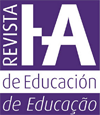Emotional intelligence: Assessment methods in the classroom
DOI:
https://doi.org/10.35362/rie3412887Keywords:
emotional intelligence, affective development, emotional skills, psychological well-being, personal growthAbstract
Educators observe daily that their students, in addition to differing in their academic level, also differ in their emotional abilities. These affective differences have not gone unnoticed neither for their parents, nor for the rest of classmates, nor for science. In the last decade, science has shown that this range of personal skills has a decisive influence on the psychological adaptation of the student in class, on their emotional well-being and even on their academic achievements and future work. One of the lines of research and study that emphasizes the use, understanding and regulation of mood states is the field of study of emotional intelligence.
Downloads
How to Cite
Downloads
Published
Issue
Section
License
Any authors who publish with this journal accept the following terms:
















